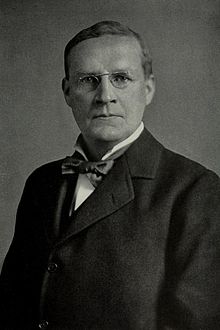David Alfred Thomas
|
The Right Honourable The Viscount Rhondda PC |
|
|---|---|
 |
|
| Minister of Food Control | |
|
In office 19 June 1917 – 3 July 1918 |
|
| Monarch | George V |
| Prime Minister | David Lloyd George |
| Preceded by | The Lord Devonport |
| Succeeded by | J. R. Clynes |
| Personal details | |
| Born |
26 March 1856 Ysguborwen, Wales |
| Died | 3 July 1918 (aged 62) Llanwern, Wales |
| Political party | Liberal |
| Spouse(s) |
Sybil Haig (1857–1941) |
David Alfred Thomas, 1st Viscount Rhondda PC (26 March 1856 – 3 July 1918), sometimes known as D. A. Thomas and styled Lord Rhondda from 1916 to 1918, was a Welsh industrialist and Liberal politician. He was UK Member of Parliament (MP) for Merthyr Tydfil from 1888 until the January 1910 general election, then MP for Cardiff until the December 1910 general election, when he left politics to concentrate on his business interests. He was made a member of the Privy Council in 1916. He later held office, notably as "Food Controller" in Lloyd George's wartime coalition government.
The son of coal owner Samuel Thomas of Ysguborwen, David Thomas was a second-generation industrialist. His energy and flair for innovation swiftly led him to build a commercial empire larger than his father's. Samuel, a man not noted for a cheerful temperament, is said to have remarked on the day of his son's birth (during a thunderstorm), "Well, I see nothing for him but the workhouse."
Although tradition cited D. A. Thomas' birthplace as being an old white-walled cottage in Aberdare, this is unlikely, given that the family home, Ysguborwen (also Aberdare), was completed in 1855. This house was built as a suitable residence for a rising industrial entrepreneur, and sets Samuel Thomas' gloomy remark in context. Samuel Thomas was one of the pioneers of the Welsh Coal business.
Samuel Thomas was a hard man, perhaps the secret of his business success, and his tastes were simple. He could never forget the hardships through which he had had to pass, and as the above quotation indicates, he was unable to shake off the fear of failure. A Welsh Baptist, he managed his household according to the "Protestant work ethic". This seems to have been its own reward, for Samuel attained civic office as High Constable of Merthyr, then the roughest town in Wales.
...
Wikipedia
